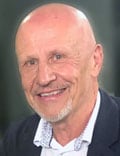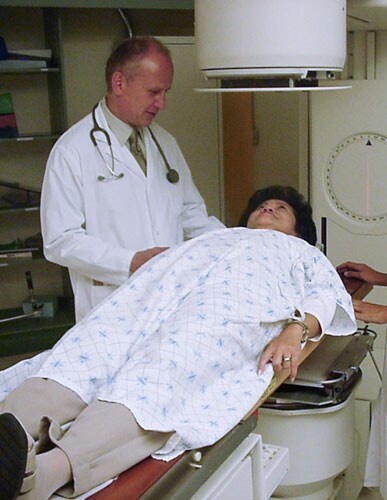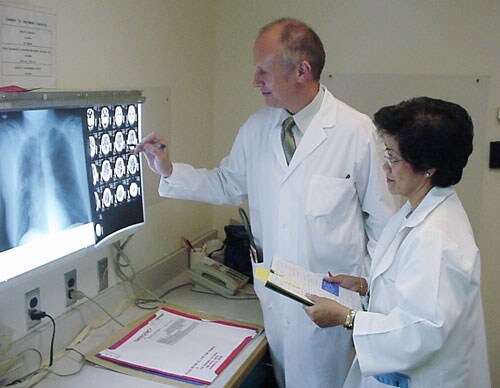Decades of treating patients with cancer had already convinced Charles Hayter, MD, of the harms that come from sugar-coating the truth. But there was an incongruity in his own life that he could not see.
Finally, in accepting his homosexuality at age 45, and coming out to his wife and children, he added the honesty that guided him professionally to his personal life — finding authenticity in both roles.
Now, at age 70, and living in Toronto, Ontario, the retired radiation oncologist and playwright has a new book, Cancer Confidential: Backstage Dramas in the Radiation Clinic.
In it, Hayter relates heartwarming stories of his journey with patients who bravely faced frightening diagnoses and challenging treatments — and even death — with grace and dignity.
It also explores his journey from drama school through medical training, and the parallels he sees between cancer care, homosexuality, and honesty.

Dr Charles Hayter
"My dad's death was really the point of attack — to use a drama term — towards my coming out," he said in an interview. "I am the oldest child and I thought, 'God I'm next. Am I really living the life I want to be living?' And when I took a hard look at myself, I realized I wasn't."
Curtain of Silence
Hayter's father was also a doctor. He was diagnosed with metastatic prostate cancer not long after his son had completed medical training.
For several years already, Charles had been struggling with his specialty's "curtain of silence" around the word cancer — a curtain he had also closed around his own sexuality.
"Why is cancer such a loaded word, a chunk of gristle that gets trapped in the gorge of doctors and replaced by sweet mushy candy-words?" he writes in his book. There is a "sub-vocabulary of oncologic obfuscation" that compels doctors to replace the word cancer with "swelling", "shadow", "spot", "mass", "lesion", "growth", and many other even more vague descriptions, he observes. "From the start of my career, I witnessed such evasion."
Cancer and homosexuality share a similar "language of evasiveness," he writes, "like families not wanting to talk about the son or daughter who's queer," he commented. Yet despite his professional commitment to straight talk, Hayter himself was paralyzed "to speak the name of the invader aloud," when confronted with his father's diagnosis.
His book tells the story of his complicated relationship with his dying father, intertwined with stories about composite patients he treated through his career. Ultimately, he reaches the conclusion that the source of a doctor's empathy and honesty comes from being grounded in one's own identity and values.
"It's about looking inside yourself and becoming reflective," he said, when asked how young oncologists can find ways to discuss a cancer diagnosis with their patients. "They need to look at their own fears around death and cancer and bad things, and why perhaps even in their own family things have not been spoken about."
The Unspoken
The stories in Hayter's book illustrate how, just as with homosexuality, a cancer diagnosis can "fracture" families, "because talking about it would mean acknowledging it, and then it's real," he said in the interview.
For example, there was Mr Singh, an elderly Punjabi patient whose family wanted to shelter him from the news of his diagnosis. "It will upset him and make him sicker," said his son. "Just go ahead and do what you have to do." These are the families that "work hard to erect an impregnable barrier of denial around elderly relatives," wrote Hayter, arguing that it's actually the truth that "begins the process of creating realistic hopes."

Dr Hayter reassures a patient about to undergo radiotherapy.
And then there was Betty, an elderly woman who refused to accept her own diagnosis despite her daughter's pleas to face up and treat it. "Mom, why don't you at least listen to what the doctor has to say?" she begged. "He's got nothing to say that would interest me," her mother replied. Yet Hayter finally coaxes her into radiation and the "massive" squamous cell carcinoma on her scalp disappears.
Cancer exposed the fractures in Hayter's own family, when his father's diagnosis prompted him to try to mend some unresolved conflicts between them. A well-meaning visit with his kids ended in a nasty confrontation over his father's rough treatment of the children. "Rage rises inside, pushing politeness, respect, compassion aside," he wrote. "You old bastard," he blurted, and his mother shrieked "How dare you? Your father's a dying man!"
Even in advanced cancer, failure to acknowledge the imminence of death closed the door on precious opportunities with Hayter's father. "Now death is imminent," he recalls. "But as the days pass, and my mother and I sit, watch, and wait, we never talk about it…At my father's bedside, I'm inexplicably tongue-tied around a subject about which I've done so much reading and reflection. I know I should raise the subject of death — but I can't do it. I'm stumbling in the footlights like and actor who's 'dried' — forgotten his lines in mid-scene."
Yet oftentimes, it is the patients who save the day by voicing what the doctors hesitate to say. "So many times over my career it was the patient who let me off the hook," he recalls, quoting a conversation he recounts in his book. "I told this patient, 'George, I don't mean to frighten you, but have you thought about what you want done if your heart stops beating and your lungs stop working?' 'You mean die?', George replied. He let me off the hook too!"
While death and pain are part and parcel of any oncologist's work, Hayter said he was drawn to radiation oncology precisely for the hope and relief it can sometimes bring — something that both patients and many doctors are unaware of. Radiation therapy, "despite its widespread use and long history…remains poorly understood," he said.
"The sad thing is, there is a lack of education amongst family doctors and palliative care doctors about the effectiveness of radiation for pain, and a reflex just to write a prescription for painkillers. So, they keep — for want of another word — drugging patients with narcotics, when they could send them for a single radiation treatment and have their pain relieved," he said.
"It's so satisfying to see someone in awful pain from bone metastases — like my dad — and to see them come back a month later, walking around again, without the need for narcotics."
The Theatre of Medicine
Drama was Hayter's first field of study. From a young age he wanted to be a clown, and then an actor. But after obtaining an MA in drama, and teaching it for two-and-a-half years, while ignoring the medical calling that both his grandfather and father had followed, the birth of his first child changed his course.
"As I watched the doctors and nurses ministering to my wife over many hours of difficult labour, I felt a tug, a pull, a calling — one so strong it seemed as though doctoring had merely laid dormant in my bones like cancer cells in remission," he writes.
He took his drama experience with him to what he calls the "theatre of medicine" where doctors and patients often play archetypal roles such as the Reticent Doctor who never uses the word cancer, or the Interfering Child who sabotages their parent's treatment plan. "These dramas can be understood for what they are: manifestations of primal human emotions such as fear, desperation, anxiety, and anger aroused by a diagnosis of cancer," he writes.
"My goal in this book is to drag these characters and their dramas from the wings to the glare of the footlights, where they can be examined more closely, and their subtext, the complex, powerful, and often irrational undercurrent of emotions can be revealed."

Dr Hayter and a colleague look over CT scans.
Although Hayter says he wrote the book mainly for patients with cancer and their families, "to bring out of the shadows all of this emotional stuff that nobody ever talks about and that doctors aren't trained to deal with," he acknowledges there are also important messages for clinicians.
"In terms of my colleagues, what I wanted to very honestly show them is the brutality — and I don't just mean physical brutality, I mean emotional brutality of what goes on, to kind of wake them up a little bit," he admits.
His book is filled with examples of his clinician-professors and colleagues regarding patients as, what he calls, "mere specimens of disease…Beneath my white coat I continued to feel disheartened and occasionally disgusted at the inhumanity of the medical machine," he writes.
An example is the weekly "case conferences" where Hayter and his colleagues sat around "a large, rectangular table, in a windowless conference room." One day, eating pizza and looking at CT scans, they discussed a patient with penile cancer, for whom penectomy was recommended. "Here is the reductionism of modern medicine carried to its extreme," he writes, explaining that even then, as a young RadOnc, he knew that radiation has been known to cure this type of cancer. "There's no sense that these images, or the specimen shown earlier by the pathologist, have any connection to a human being…the notion that patients are human beings who might want to have a say in their treatment is a foreign concept."
Sure enough, his argument for a course of radiation was cut down by the chief of urology, whom he describes as "a squat, pugnacious-looking man" with a "flat, squashed nose suggestive of injuries from a previous boxing career," and the patient was treated with penectomy without being given any choice.
Although he freely admits he has no magic bullet for "the problem of the Detached Doctor," Hayter's personal story offers insight. "An encounter with a patient involves science, art — and authenticity," he writes. "Doctors only truly connect with patients when they allow themselves the freedom to step from the closet, loosen their professional masks, and let their authentic selves shine."
He continues to explore his "authentic self" in retirement, writing plays. His new play, Straight Jacket Escape, will get its first reading this month in Toronto. It is based on the apparently true story about a young Harry Houdini who got the idea for his famous straight jacket escape while visiting a lunatic asylum in Saint John, New Brunswick. In the play, a patient at the asylum is restrained in a straight jacket as punishment for being gay.
In addition to the theme of homosexuality, which runs through much of Hayter's writing, he also draws on his expertise as a medical historian. His 2015 book An Element of Hope focuses on the introduction of radium therapy, and his play Radical tells the story of his former mentor and "forgotten Canadian hero," oncologist Dr Vera Peters, and "her fight with surgeons to abandon the radical mastectomy."
Cancer Confidential: Backstage Dramas in the Radiation Clinic. By Charles Hayter, MD. University of Toronto Press / Aevo UTP. 2022
Kate Johnson is a Montreal-based freelance medical journalist who has been writing for more than 30 years about all areas of medicine.
For more from Medscape Oncology, join us on Twitter and Facebook
Credits:
Images: Dr Charles Hayden
Medscape Medical News © 2022 WebMD, LLC
Send news tips to news@medscape.net.
Cite this: Cancer and the 'Curtain of Silence':A RadOnc Looks Back - Medscape - Sep 19, 2022.










Comments